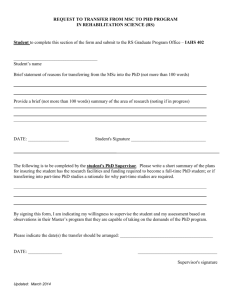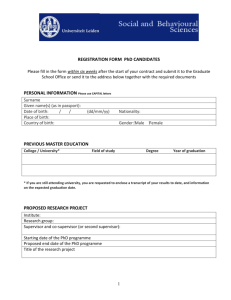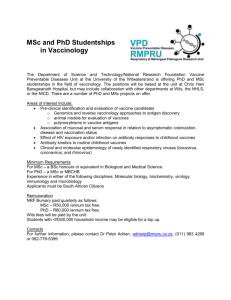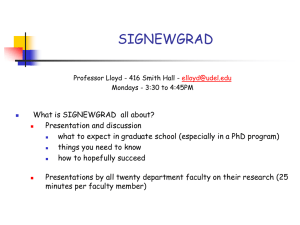Pharmaceutical Sciences - School of Graduate Studies
advertisement
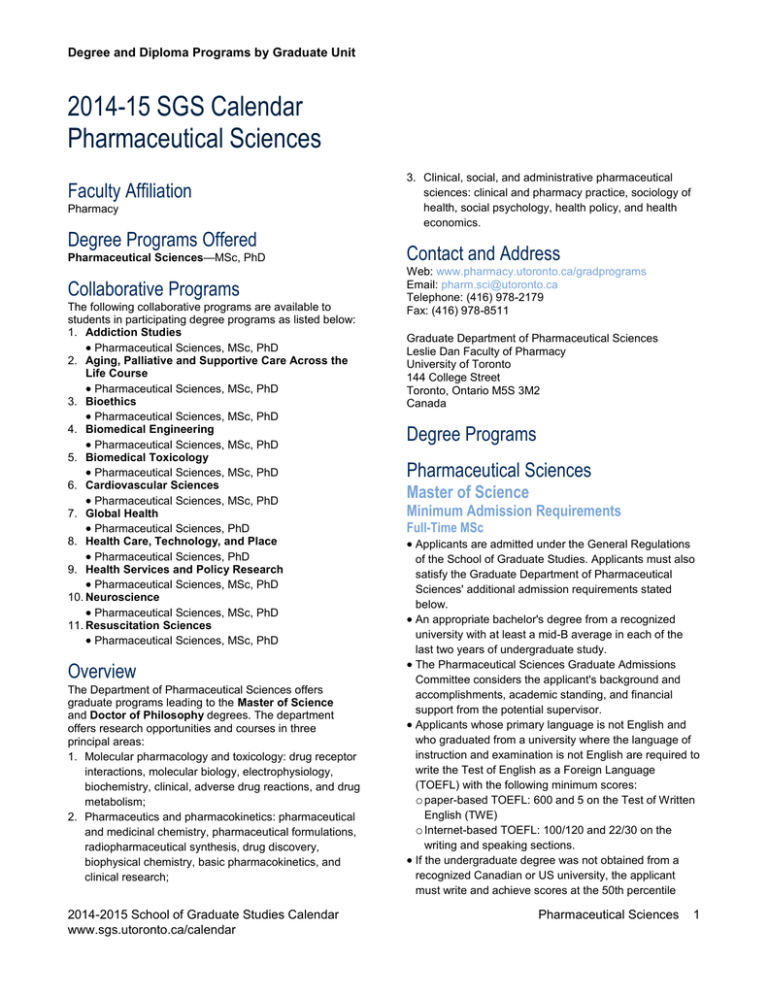
Degree and Diploma Programs by Graduate Unit 2014-15 SGS Calendar Pharmaceutical Sciences Faculty Affiliation Pharmacy Degree Programs Offered 3. Clinical, social, and administrative pharmaceutical sciences: clinical and pharmacy practice, sociology of health, social psychology, health policy, and health economics. Pharmaceutical Sciences—MSc, PhD Contact and Address Collaborative Programs Web: www.pharmacy.utoronto.ca/gradprograms Email: pharm.sci@utoronto.ca Telephone: (416) 978-2179 Fax: (416) 978-8511 The following collaborative programs are available to students in participating degree programs as listed below: 1. Addiction Studies Pharmaceutical Sciences, MSc, PhD 2. Aging, Palliative and Supportive Care Across the Life Course Pharmaceutical Sciences, MSc, PhD 3. Bioethics Pharmaceutical Sciences, MSc, PhD 4. Biomedical Engineering Pharmaceutical Sciences, MSc, PhD 5. Biomedical Toxicology Pharmaceutical Sciences, MSc, PhD 6. Cardiovascular Sciences Pharmaceutical Sciences, MSc, PhD 7. Global Health Pharmaceutical Sciences, PhD 8. Health Care, Technology, and Place Pharmaceutical Sciences, PhD 9. Health Services and Policy Research Pharmaceutical Sciences, MSc, PhD 10. Neuroscience Pharmaceutical Sciences, MSc, PhD 11. Resuscitation Sciences Pharmaceutical Sciences, MSc, PhD Overview The Department of Pharmaceutical Sciences offers graduate programs leading to the Master of Science and Doctor of Philosophy degrees. The department offers research opportunities and courses in three principal areas: 1. Molecular pharmacology and toxicology: drug receptor interactions, molecular biology, electrophysiology, biochemistry, clinical, adverse drug reactions, and drug metabolism; 2. Pharmaceutics and pharmacokinetics: pharmaceutical and medicinal chemistry, pharmaceutical formulations, radiopharmaceutical synthesis, drug discovery, biophysical chemistry, basic pharmacokinetics, and clinical research; 2014-2015 School of Graduate Studies Calendar www.sgs.utoronto.ca/calendar Graduate Department of Pharmaceutical Sciences Leslie Dan Faculty of Pharmacy University of Toronto 144 College Street Toronto, Ontario M5S 3M2 Canada Degree Programs Pharmaceutical Sciences Master of Science Minimum Admission Requirements Full-Time MSc Applicants are admitted under the General Regulations of the School of Graduate Studies. Applicants must also satisfy the Graduate Department of Pharmaceutical Sciences' additional admission requirements stated below. An appropriate bachelor's degree from a recognized university with at least a mid-B average in each of the last two years of undergraduate study. The Pharmaceutical Sciences Graduate Admissions Committee considers the applicant's background and accomplishments, academic standing, and financial support from the potential supervisor. Applicants whose primary language is not English and who graduated from a university where the language of instruction and examination is not English are required to write the Test of English as a Foreign Language (TOEFL) with the following minimum scores: o paper-based TOEFL: 600 and 5 on the Test of Written English (TWE) o Internet-based TOEFL: 100/120 and 22/30 on the writing and speaking sections. If the undergraduate degree was not obtained from a recognized Canadian or US university, the applicant must write and achieve scores at the 50th percentile Pharmaceutical Sciences 1 Degree and Diploma Programs by Graduate Unit ranking or better on the Graduate Record Examination (GRE; General Test). Part-Time MSc A limited number of students will be admitted to the MSc program on a part-time basis. All admission requirements are the same as for the full-time MSc. Program Requirements Full-Time MSc A program of study that provides the appropriate foundation for thesis research. The program depends on the student's background and is planned in consultation with the supervisor and advisory committee, with the approval of the graduate chair. The student normally completes 2.0 full-course equivalents (FCEs), but a minimum of 1.0 FCE is required. Yearly advisory committee meetings. One poster presentation given to all faculty and graduate students at Graduate Research in Progress (GRIP), and yearly attendance at GRIP. Regular attendance at the graduate departmental and student group seminars. An oral presentation of own research work is given after the first 12 months of registration in the program. Final seminar to be given during the thesis defence. A thesis based on an approved research problem in a field of pharmaceutical sciences. Part-Time MSc All requirements are the same as for the MSc full-time program. Program Length 6 sessions full-time (typical registration sequence: F/W/S/F/W/S)**; 14 sessions part-time Time Limit 3 years full-time; 6 years part-time **Applicants may apply to the Fall or Winter session only. Doctor of Philosophy Minimum Admission Requirements Full-Time PhD Applicants are admitted under the General Regulations of the School of Graduate Studies. Applicants must also satisfy the Graduate Department of Pharmaceutical Sciences' additional admission requirements stated below. Appropriate master's degree from a recognized university with a minimum overall B+ average. Under exceptional circumstances, students may be admitted directly to the PhD program with an appropriate bachelor's degree. Factors considered include academic standing, ability to conduct re-search, and availability of financial support from the potential supervisor. 2014-2015 School of Graduate Studies Calendar www.sgs.utoronto.ca/calendar The Pharmaceutical Sciences Graduate Admissions Committee considers the applicant's backgroundand accomplishments, academic standing, and financial support from the potential supervisor. Applicants whose primary language is not English and who graduated from a university where the language of instruction and examination is not English are required to write the Test of English as a Foreign Language (TOEFL) with the following minimum scores: o paper-based TOEFL: 600 and 5 on the Test of Written English (TWE) o Internet-based TOEFL: 100/120 and 22/30 on the writing and speaking sections If the undergraduate degree was not obtained from a recognized Canadian or US university, the applicant must write the Graduate Record Examination (GRE; General Test) and achieve scores at the 50th percentile ranking or better on the Verbal and Quantitative components and a minimum score of 5.0 on the Analytical Writing component. Transfer from MSc to PhD Students who have a high academic standing and a clearly demonstrated ability to do research at the doctoral level may be eligible to transfer to the PhD program after one year in the MSc program. The student must have completed at least 1.0 FCE with an average grade of A- and have financial support. A transfer from the MSc program to the PhD program occurs normally within 15 months of the student's first registration in the MSc program. Flexible-Time PhD The department offers a flexible-time PhD program option for selected students. This program benefits professionals with career obligations and whose employment is closely related to their intended area of research. Applicants must meet all the admission requirements for entry to the full-time PhD program in pharmaceutical sciences. A letter of support from the employer. The departmental admissions committee reviews the applications; admission is highly selective with preference given to applicants who: o are members in good standing of a regulated profession or scientific society, and o hold a university appointment in Canada at an academic standard equivalent to the University of Toronto Lecturer. Program Requirements Full-Time PhD A program of study that provides the appropriate foundation for thesis research. The program depends on the student's background and is planned in consultation Pharmaceutical Sciences 2 Degree and Diploma Programs by Graduate Unit with the supervisor and advisorycommittee, with the approval of the graduate chair. Students normally complete 2.0 FCEs. Students admitted directly to the PhD program with a BSc must complete 3.0 FCEs. Yearly advisory committee meetings. Successful completion of a PhD qualifying examination within the first 24 months of the program. Students are permitted a second attempt, if necessary, to satisfactorily complete the examination. The format of the examination will include the student giving a 20-minute presentation based on the proposal distributed to the Qualifying Examination Committee, followed by a question period. The student is expected to demonstrate appropriate understanding of the scientific basis of the research, the methodological approaches, and the technical details. Failure to successfully complete the PhD qualifying examination will result in a recommendation for termination of registration in the program. Research presentation(s) to all faculty and graduate students at Graduate Research in Progress (GRIP). Students entering the program with an MSc degree must complete one oral presentation. Direct-entry PhD students must complete two poster presentations, one of which may be a peer-reviewed conference. Annual attendance at GRIP, and an exit full-length research seminar to be given before the thesis defence. Regular attendance, with a minimum of eight Pharmaceutical Sciences departmental seminars in each academic year. In addition to the departmental exit seminar held within three months of the final thesis defence, all PhD students are required to give an oral research presentation of approximately 20 to 30 minutes every year after the first 12 months of registration in the program, unless the student presents at GRIP. A thesis in conformity with University of Toronto regulations, based on research conducted while registered in a PhD program at the University of Toronto. Students are required to be on campus and participating full-time (including summer) until all program requirements are completed. Simultaneous registration in another full-time degree program is not allowed. Coursework should normally be completed within the first three years of registration. Flexible-Time PhD The program requirements for the flexible-time PhD option are identical to those listed above for thefull-time PhD program. Students whose current professional background is such that they would be deemed to have fulfilled a significant portion of the requirements contained in the department seminar series may be eligible for a reduction of four seminars upon consultation with the admissions committee. Successful completion of a PhD qualifying examination within the first 32 months of the program. Students are permitted a second attempt, if necessary, to satisfactorily complete the examination. The format of the examination will include the student giving a 20-minute presentation based on the proposal distributed to the Qualifying Examination Committee, followed by a question period. The student is expected to demonstrate appropriate understanding of the scientific basis of the research, the methodological approaches, and the technical details. Failure to successfully complete the PhD qualifying examination will result in a recommendation for termination of registration in the program. Students must ensure that they have adequate time on campus to attend classes and to fulfil the academic requirements. Full-time registration is required for the first four years for those entering the program with a master's degree; five years for those with a bachelor's degree. Thereafter, students may register part-time. Program Length 4 years full-time; 5 years direct-entry; 5 years transferfrom-master's; 7 years flexible-time Time Limit 6 years full-time; 7 years direct-entry; 7 years transferfrom-master's; 7 years flexible-time Course List Please consult the department's timetable for courses offered in a given year. PHM 1107H Advanced Pharmacokinetics Course I PHM 1109H Recent Developments in Dosage Form Design (prerequisite: PHM 224Y or equivalent) PHM 1115H Special Topics in Radiopharmaceuticals II Transfer from MSc to PhD The transferred student must complete all remaining course requirements of the MSc program, except the thesis, in addition to the requirements of the PhD program. Credit is given in the doctoral program for research and graduate courses completed prior to the transfer. 2014-2015 School of Graduate Studies Calendar www.sgs.utoronto.ca/calendar PHM 1120H+ Selected Research Topics in the Pharmaceutical Sciences PHM 1122H Fundamentals of Drug Discovery Pharmaceutical Sciences 3 Degree and Diploma Programs by Graduate Unit PHM 1124H The Power and Politics of Global Pharmaceutical Policy PHM 1128H Introduction to Models and Methods of Research in Clinical, Social, and Administrative Pharmacy PHM 1130H Biomolecular Interactions and Thermodynamics I PHM 1131H Biomolecular Interactions and Thermodynamics II PHM 1132H Applied Health Econometrics PHM 1133H Special Topics in Pharmaceutical Sciences Reading Course BTC 1830H Medical and Scientific Marketing JFK 1120H Selected Topics in Drug Development I JFK 1121H Selected Topics in Drug Development II JFK 1122H Drug Transport Across Biological Membranes JNP 1014Y Interdisciplinary Toxicology JNP 1017H+ Current Topics in Molecular and Biochemical Toxicology JNP 1018H+ Molecular and Biochemical Basis of Toxicology PAS 3700H Multidisciplinary Aspects of Addictions PCL 1004Y Clinical Pharmacology PPG 2010H Panel Data Methods for Public Policy Analysis Extended course. For academic reasons, coursework is extended into session following academic session in which course is offered. + 2014-2015 School of Graduate Studies Calendar www.sgs.utoronto.ca/calendar Pharmaceutical Sciences 4

